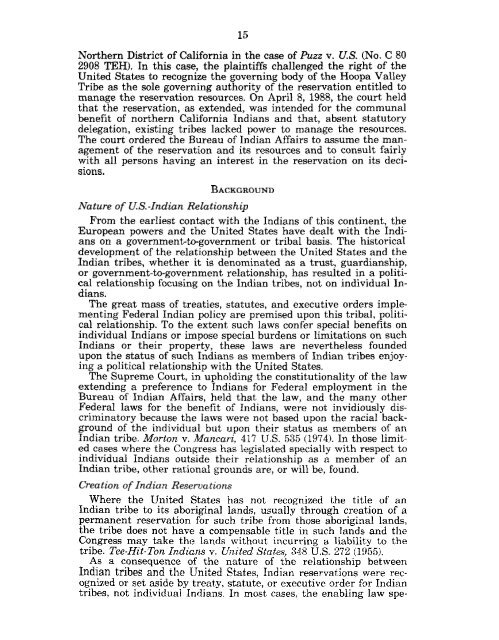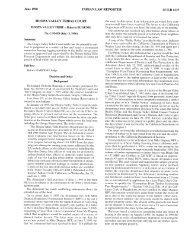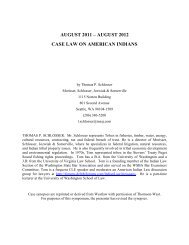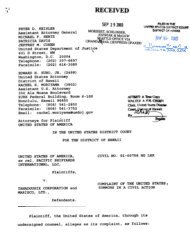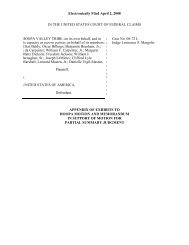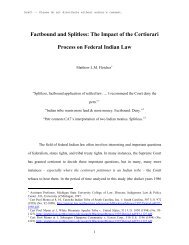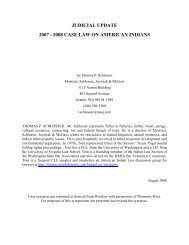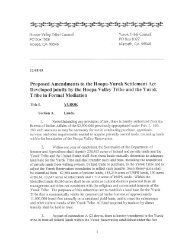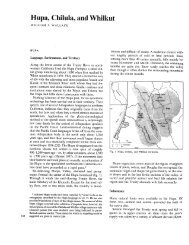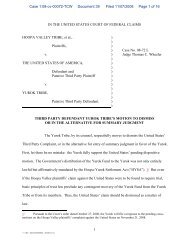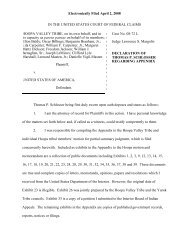Create successful ePaper yourself
Turn your PDF publications into a flip-book with our unique Google optimized e-Paper software.
15Northern District of California in the case of fizz v. US. (No. C 802908 TEH). In this case, the plaintiffs challenged the right of theUnited States to recognize the governing body of the Hoopa ValleyTribe as the sole governing authority of the reservation entitled tomanage the reservation resources. On April 8, 1988, the court heldthat the reservation, as extended, was intended for the communalbenefit of northern California Indians and that, absent statutorydelegation, existing tribes lacked power to manage the resources.The court ordered the Bureau of Indian Affairs to assume the managementof the reservation and its resources and to consult fairlywith all persons having an interest in the reservation on its decisions.BACKGROUNDNature of US.-Indian RelationshipFrom the earliest contact with the Indians of this continent, theEuropean powers and the United States have dealt with the Indianson a government-to-government or tribal basis. The historicaldevelopment of the relationship between the United States and theIndian tribes, whether it is denominated as a trust, guardianship,or government-to-government relationship, has resulted in a politicalrelationship focusing on the Indian tribes, not on individual Indians.The great mass of treaties, statutes, and executive orders implementingFederal Indian policy are premised upon this tribal, politicalrelationship. To the extent such laws confer special benefits onindividual Indians or impose special burdens or limitations on suchIndians or their property, these laws are nevertheless foundedupon the status of such Indians as members of Indian tribes enjoyinga political relationship with the United States.The Supreme Court, in upholding the constitutionality of the lawextending a preference to Indians for Federal employment in theBureau of Indian Affairs, held that the law, and the many otherFederal laws for the benefit of Indians, were not invidiously discriminatorybecause the laws were not based upon the racial backgroundof the individual but upon their status as members of anIndian tribe. Morton. v. Mancart, 41'7 U.S. 535 (1974). In those limitedcases where the Congress has legislated specially with respect toindividual Indians outside their relationship as a member of anIndian tribe, other rational grounds are, or will be, found.Crea.tion of 1ndia.n Reserua.tionsWhere the United States has not recognized the title of anIndian tribe to its aboriginal lands, usually through creation of apermanent reservation for such tribe from those aboriginal lands,the tribe does not have a cornpensable t,itle in such lands and theCongress may take the lands without incurring a 1iabilit.y to thetribe. Tee-Hit-Ton In.dicLris v. Uzited States, 348 U.S. 272 (19553.As a consequence of the nature of the relatioiiship betweenIndian tribes and the United States, Indian reservations were recognizedor set aside by treat,y, statute, or executive order for Indiantribes, not individuai Indians. In most, cases, the enabling law spe-


